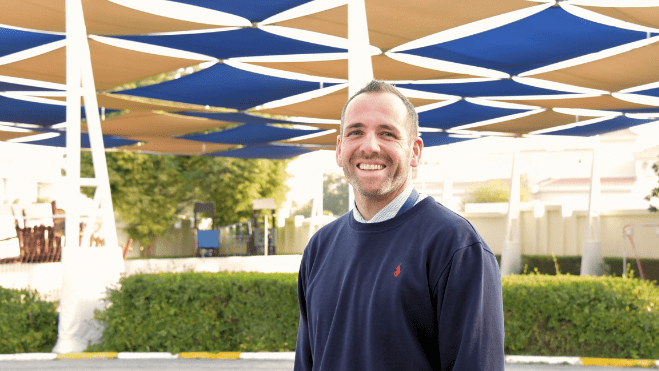The Power of Outdoor Learning
With what skills would you like your child to leave school?
Good grades and a place at university usually appear fairly high on most parents’ wish lists. Increasingly, however, parents are attaching greater importance to ‘life skills’ and ‘citizenship skills’ – skills that help us in life, but that can’t easily be learnt in the classroom (or at home). Skills such as leadership, resilience, commitment, time management, helping others, communication and teamwork – skills recruiters look for when hiring employees and admissions officers look for when offering university places.
I recently gave a presentation titled “Not All Learning Takes Place in the Classroom” at the Qatar Teaching and Learning Forum, where I highlighted a few ways that schools can develop these life and citizenship skills and help produce young people who are not only going to succeed for themselves, but contribute to society. This is a hot topic in education circles at the moment and is an area in which schools can really make a difference to a young person’s development and therefore to society.
At Compass International School Doha (Compass), we have embraced the Duke of Edinburgh’s International Award (DofE) as a framework to help young people learn new skills, get physically fit, serve the community and foster a sense of adventure. Award participants have to commit to three activities for a period of 3 to 18 months depending on the level of the award. This ensures that success does not come easily and embeds the requirements to be committed and resilient.
The highlight for most students is the Adventurous Journey where students walk in groups of four to seven carrying all their equipment and food for a self-sufficient two day (Bronze), three day (Silver) or four day (Gold) Expedition. The older the participants are, the more hands-off the supervision becomes and the more involved they get in the planning and decision-making. The expeditions force participants to plan collaboratively so that when things go wrong (and they always do to some degree), they begin to deal with the difficulties of taking responsibility, making joint decisions, avoiding and dealing with the fall-out from disagreements, and having to continue for the sake of the team when all they really want to do is collapse in a heap.
Students at Compass are encouraged to begin their DofE experience with the Bronze Expedition partway through Year 9, so they can complete Silver before their IGCSE exams begin in Year 11 and complete Gold before the end of Year 13. This allows them to develop these life skills as well as have an award which is globally recognised and enhances both university and job applications.
The International Baccalaureate (IB) Diploma Programme considers the benefits of learning outside the classroom so valuable that all IB students are required to spend 150 hours during Years 12 and 13 completing Creativity, Action and Service (CAS) to receive their Diploma. At Compass, Year 12 students spend a week participating in a community service project in Tanzania. Next year, Year 12 students will be able to do their DofE Adventurous Journey in one of Tanzania’s nature reserves immediately after their CAS project to experience some of the incredible wildlife the country has to offer.
In addition, Compass offers a wide range of Extra Curricular Activities (ECAs), sports teams, expeditions, music ensembles, student leadership bodies and clubs which all contribute to the development of these skills and allow progress towards becoming the kind of individual we all wish we had become.
So how can you help your child with the development of life and citizenship skills? Encourage participation in ECAs, sports and outdoor activities such as Scouts and DofE. Encourage them to go on school trips and expeditions. Remind them that exam grades are only part of their university and job applications. Allow them to develop time-management skills by giving them the freedom to do what they enjoy doing alongside completing their school work. Reflect on the skills you use most in the workplace and find ways to help them develop them. Demonstrate to them what a good citizen looks like. And above all, let them make mistakes so that they can learn from them.
Dr John Warren
Phase Leader for Years 7, 8 and 9, Duke of Edinburgh’s International Award Coordinator
About Compass International School Doha
Compass International School Doha is one of Qatar’s leading international schools situated over four campuses in Doha, combining the very best of British and international curricula. The Rayyan and Gharaffa Campus offers Early Years through to Primary education and the Madinat Khalifa Campus offers Primary and Secondary education. The new Themaid Campus is the largest campus and is a state of the art, purpose-built campus offering Early Years through to Secondary education. The English National Curriculum, International Primary Curriculum, IGCSE and IBDP are all offered. Future years will accommodate A levels as well as other vocational programmes (BTEC). Specialist bi-lingual programmes are available at the Madinat Khalifa Secondary Campus, Gharaffa Campus and Rayyan Campus.
About Dr John Warren
Dr John Warren is a Phase Leader for Years 7, 8 and 9 and the Duke of Edinburgh’s International Award Coordinator at Compass International School Doha.
About the Duke of Edinburgh’s International Award
For the past seven decades, the Duke of Edinburgh’s International Award (DofE) has inspired and transformed the lives of millions of young people from all walks of life. From volunteering to physical activities, life skills to expeditions, achieving a DofE Award is a passport to a brighter future, valued by employers and universities.






